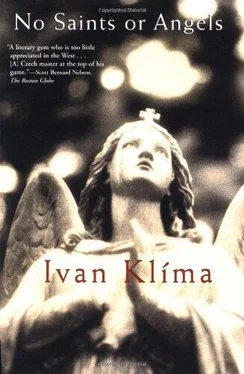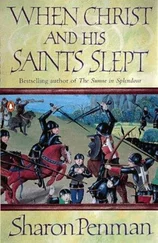toxic like potatoes and she refuses to eat peppers because they contain too much zinc or some dangerous metal or other, besides which they could be genetically modified. Thanks to her diet she has managed to rid her body of all toxins and noxious fluids; she has got rid of all her pains and lost her excess weight, and her eyes and voice have improved.
I pour myself a glass of wine and she takes out of her handbag a little bottle with some elixir or other.
I have neither wheat berries nor fermented vegetables. All I can offer is some rye bread which at her request I sprinkle with parsley and chives.
'You ought to adopt a healthier lifestyle too,' she tells me and heaves a deep sigh. Surprisingly she refrains from saying, as on previous occasions, that my flat is unbearably smoky, but even so she annoys me with her condescending self-assurance: she knows, as our father did, just what is right and healthy — for herself and the rest of humanity.
For a while she tells me all about her successful concerts and then offers to reimburse me all the funeral expenses.
'We'll go halves,' I say. Then for a while we say nothing: two sisters who have nothing to say to each other.
I recall Dad's diaries. When I was looking through them, I tell her, I discovered that Dad had a mistress.
My sister is not taken aback by the news but simply takes it in her stride. 'There's nothing odd in that: all blokes have mistresses. He wasn't the US President, so he could risk it.'
I tell her that he apparently had a child with his mistress. When I was last looking through his diaries I came across a death notice from ten years ago announcing the death of a certain Veronika Veselá. It was signed by just one person: her son, Václav Alois Veselý, and bore his address.
'You mean to say that the one who died was Dad's bit on the side? And this Václav bloke is something like our half-brother?'
'She gave him his second name after Dad.'
'So what? We didn't know anything about him — for how many years?'
I tell her he must be about two years older than her.
'We didn't know anything about him for forty years,' she calculates quickly, 'so why should we bother about him now. There wasn't any inheritance anyway. We haven't cheated him out of anything, so he's got nothing to fight with us over.'
'But it's not just a question of the inheritance.' Doesn't she find it strange that there's someone with the same father as ours who has been walking the earth for all this time without our knowing anything about him?
'That's typical of Dad. He was well trained in keeping mum about all sorts of highly secret matters. And where does this new relative of ours live?' she asks, suddenly curious after all.
'In Karlín. It must be somewhere near the river, to judge by the name of the street.'
'I might be singing at the theatre in Karlín, if things work out.'
'Mum has never suspected anything,' I say, ignoring the important news that she will be singing in Prague.
'Or perhaps she didn't want to. It would be better for her that way.'
'No, more likely she believed all his guff about a new morality.'
For a while we argue about what Mum believed in and what Dad did. And then my sister comments that every woman prefers to shut her eyes rather than see what is really going on. I was the one who had behaved stupidly.
'What's that supposed to mean?'
'You found out that Karel was betraying you and couldn't think of anything better to do than divorce him. What good did it do you? You were left on your own.'
I refrain from saying that I was left on my own because I wouldn't let myself be made a slave. Nor do I tell her that you have to act according to your feelings and do what you feel is right, and not what is most convenient. 'You're on your own too.'
'That's neither here nor there. I always have some bloke or other and I'm not saddled with a daughter.'
'You've always got to be different. And as for Jana, I'm glad I have her.'
'By the way, I don't like the look of that girl of yours,' she says.
'Maybe she doesn't care whether you like the look of her or not.'
'There's something strange about her eyes,' she continues. 'I noticed it there at the cemetery. People normally have one kind eye and one unkind one, but she doesn't.'
'Both your eyes are unkind,' I tell her, 'and I don't think you're not normal.'
'My left eye's kinder than the right one,' she assures me, 'but we're not talking about me. Her eyes aren't kind or unkind, they're elsewhere, and that's something you, as her mother, should notice.'
'What are you trying to say?'
'That girl of yours is on drugs,' she declares. 'I'd stake my life on it.'
'Jana is not on drugs,' I yell. 'You're trying to find a way to harm us!'
'Kristýna,' she says, putting her hand on my shoulder, 'I've never wanted to do you any harm. You're the one who always did yourself harm, by brooding on everything. But that dead expression and the dilated pupils is something I know only too well.' She checks herself and then explains: 'Two of the guys in the band were injecting piko and one was on heroin. If you ignore it, it'll be the worse for your daughter. It's no skin off my nose.'
'I know it's no skin off your nose. You never could give a damn about us.' I don't go on to tell her that her diet may have cleared the toxins out of her body, but they stayed in her mind.
When my sister leaves I remember the anonymous letter and take my tormentor's latest message out of my handbag.
He tells me that he follows my every step and the moment is at hand when the gates of hell will close behind me.
2
Jan would like us to see each other every day. See each other and make love. He wants me to act his age. But I'm not twenty any more. When I get home from the surgery in the evening I'm aching all over: my legs, my back, my arms and my mind. But even if I felt like going to see him, I'm the mother of an adolescent girl that I'm very worried about.
Even though my sister never wastes an opportunity to tell me something unpleasant, I'm unable to get her warning out of my mind.
I watch Jana's eyes. Does she have a fixed stare? Are her pupils dilated? Maybe I ought to check her all over each evening and look for track marks, but I'm ashamed to because it would be degrading for both of us.
'Jana, where have you been all afternoon?'
'In the park, of course.'
'What do you go there for, all the time?'
'Nothing. There are cool people there.'
'What do you get up to there?'
'Mum, there's no point in you interrogating me all the time. You won't ever understand anyway.'
She acts more and more defiantly, convinced that her life is her own business; it's nothing to do with me how she spends her time, what she'll become or how she enjoys herself. Whenever I ask her straight out if she's shooting up she adopts a hurt expression: how could something so vile occur to me?
Jan called me twice today inviting me to some club or other where they play those hero games.
I didn't tell him that I'm already of an age when people don't usually have either the time or the inclination to play at heroes or even cowards. I asked him how long such games go on for and he told me that they often last several weeks.
'Nonstop?'
'With breaks,' he laughed. 'But they mostly go on till at least midnight.'
I'll persuade Mum to come and stay the night. Not so long ago I used to ask her to babysit more often but now I get the feeling that it bothers her to leave her flat. But she loves her only grandchild, and surprisingly enough my adolescent is less impudent when she is around.
Mum arrives after seven in the evening when I'm already getting dressed up. 'Off to the theatre?' she asks.
I shake my head in reply.
Читать дальше












